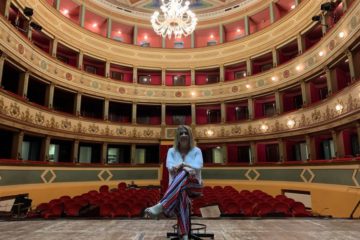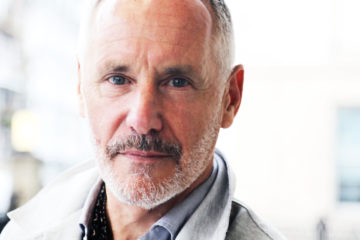American countertenor Anthony Roth Costanzo has a voice of sheer beauty and what appears to be an insatiable passion for opera and the arts. An enthusiastic supporter of new works, Anthony will soon be on stage at Opera Philadelphia in George Benjamin and Martin Crimp’s Written On Skin. I am thrilled that Anthony was willing to take some time to answer a few of my questions about this exciting production and his love of the art form.
You will soon be performing in Written On Skin at Opera Philadelphia. Many operagoers aren’t familiar with this work. Tell us a bit about the story and your take on it. How can modern audiences connect with it?
Part of what makes Written on Skin so thrilling is that the libretto is both authoritative in its clarity, and filled with complexities and ambiguities which make each audience member’s interpretation slightly different. At the story’s core is a love triangle in the 13th Century; a wealthy feudal lord (the Protector) who counts his wife among his possessions and wants his portrait painted by a skilled young painter of illuminated manuscripts (me). The wife is hungry for real love and excitement, the Protector is possessive of his wife but fascinated by the boy, and the boy seems at times pulled in multiple directions, but ultimately gives-in to the wife’s advances. What ensues is heart-wrenching and gruesome all at once. But amidst all this medieval intrigue, there is a overlay of contemporary culture in the form of angels dispassionately watching this unfold from the future.

Is this a role debut for you? Are there any particularly challenging musical or emotional moments in it for your character?
The entire score is a musical challenge! It’s a complete masterpiece and as such, I want to get every detail just right. The rhythm is complex, the pitches aren’t intuitive, and the pacing and dense, but when done well, it has a liquid transparency that allows both emotion and story to come through brilliantly. Precision is key, and that’s in part why I am so thrilled to have Corrado Rovaris conducting. He makes every challenge feel surmountable. Emotionally, I take a layered approach to the boy. He knows how good he is at painting, and he knows how to seduce someone like the Protector in order to make a sale. He is also a teenage boy, and so when he finds himself falling in love with Agnès, the precociousness and maturity he has as an artist and salesman begin to crumble, and he gives in to youthful abandon. He bounces between these two sides of himself until finally he makes a decision, driven by passion, that turns out to be fatal.
Being a new opera, Written On Skin doesn’t have a long performance history, but what is unique about Opera Philadelphia’s production?
OP’s production is only the second full production of this wonderful work. Our incisive director Will Kerley has creatively taken on the libretto’s many challenges, moving us beautifully and swiftly from forest to the future to a workshop to a bedroom. He has brilliantly invented many devices, all rooted in the libretto, to literally and figuratively illuminate the tale. That said, beyond the design of the set and costumes, and the staging itself, I think this production will represent a different psychological perspective. As a team, we have all worked to mine the richness of the words in order to create a series of overlapping journeys for our characters that we hope will be gripping.
What’s something about countertenors that you think most people don’t know or that they misunderstand?
I would say that most people in the world have no idea what a countertenor is! It’s one of the things I love about singing the way I do. The shock on someone’s face when I open my mouth and sing in a woman’s register is always fun for me. (A nice example here: https://www.youtube.com/watch?v=jVsVHSzv0og). Many people think it is a rare talent that only a few people in the world have, but almost every man has a falsetto, and technically anyone of them could be a countertenor! Even so, we are relatively rare birds, and the number of countertenors working in the opera world, when compared to Soprano, Mezzos, Baritones, and Tenors, is infinitesimal.

You are known for your passion for contemporary works. What is it about new opera that you’re so attracted to?
I love to take part in creating the future of opera as well as keeping the past alive and vibrant. Working with living composers and librettists is thrilling not only in that it allows a singer to have a certain creative agency, but it also makes me feel I can incorporate their whole ethos into the colors and textures of my singing. I get to make sounds, explore contemporary subjects, and generate ideas in ways that are distinct from the process of interpreting something written hundreds of years ago.
Reading your bio, I was intrigued by the production of The Tales of Genji you were a part of in Kyoto. One of my favorite courses in college was Japanese Literature, during which I read excerpts from Genji and developed a love of Noh drama. Did you read the entire, massive novel of The Tale of Genji? What was the production like?
It was a truly thrilling project, the genesis of which is a very long story. I did read much of Genji, and helped create one of the few collaborations between some of the most famous Kabuki and Noh performers in Japan and a western classical artist. We have done it twice in Kyoto and bring it to Tokyo this summer. We found a way to seamless blend baroque opera into the emotional trajectory of Genji as performed by both Kabuki and Noh actors, and I was privy to some of the most sacred and secret Japanese theatrical traditions. It was an experience that changed my life. (https://www.youtube.com/watch?v=1VXn7wzutkI)
I just watched a fantastic interview you did with Living the Classical Life. One of the parts that stood out to me was when you were discussing art’s place in a world with so many “real” problems, problems that make the concern a singer might feel over the mispronunciation of a vowel seem petty. I’ve often wondered if “high” art is merely an unnecessary luxury bankrolled by the rich and those desiring to project an image of sophistication. Could the funding of rich donors that pours into major opera houses go to causes that more directly and assuredly improve people’s daily lives around the world?
I think art is necessary. It gives our lives meaning, it provides beauty, which I think is healing, and it gives us insight into our experiences. In Europe, opera is considered so necessary that it is almost entirely government funded. When I work with underprivileged kids, I see how opera transforms them; when I make friends who have never been to the opera, I see the impact it can have on them. I don’t think the problem is the resources being invested in culture, but rather making sure that we give the widest possible audience points of access to this art form and find ways to engage a diverse and distant target viewership.
What do you think the key to keeping opera alive and vibrant in today’s world is?
Interdisciplinary collaboration, creative thinking, risks on the stage and off, new contexts, engaged performers, arts education in schools, and I could go on…
How would you complete this sentence? Opera at its best…
Gives you emotional epiphanies!
To finish, I’d like to ask a question I ask everyone: what is it about opera that touched your soul?
Direct, primal communication using the human voice taken to Olympic extremes.


